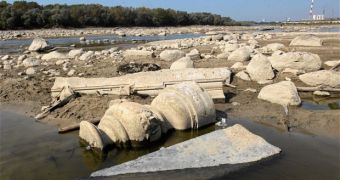A treasure emerged on the dried bed of the Polish Vistula River, after apparently having stayed hidden on its bottom since the Swedish invasion of Poland in 1655.
Ornate stonework and rare marble carvings have been found, all taken from palaces, residential homes and, believe it or not, cemeteries. The Telegraph reports that "Marble cornices, arches, portals [and] window sills” were amongst the sunken relics.
The artwork has been well preserved by the waters of the river.
“Although they've been lying under water for hundreds of years a layer of silt may have protected them," archaeologist Jaroslaw Zielinski said.
In 1655, the Poles were invaded by their Swedish neighbors, and literally lost tons of artwork to their looting neighbors. This period is remembered by locals as "the Deluge."
The barges of looted goods would sail along the Vistula until they reached the Gdansk port. From there, they would be transported to restoration facilities in Sweden.
A letter dated October 1656 documented the loss of 50-60 tons of spoils that had sunk near Warsow, the capital city of Poland. Experts believed that the contents of that barge now lie on the dried river bed.
Mr. Zielinski presented the theory that all the stonework was broken into separate pieces to enable the Swedes to transport it. After reaching their destination, the pieces “could all have been stuck back together again," Mr Zielinski explained.
"You can see the Scandinavian robbers had this intention when they first broke the objects up," he added.
Historians are still laboring over the assessment of this incredible find. The pieces cannot be extracted from the river bed at this time, as the experts' equipment would sink in the very mud that preserved the artifacts.
When water levels rise up again, a floating crane will be used to recover the items. Until then, a police guard is securing the area, in an effort to keep treasure hunters at bay.

 14 DAY TRIAL //
14 DAY TRIAL //